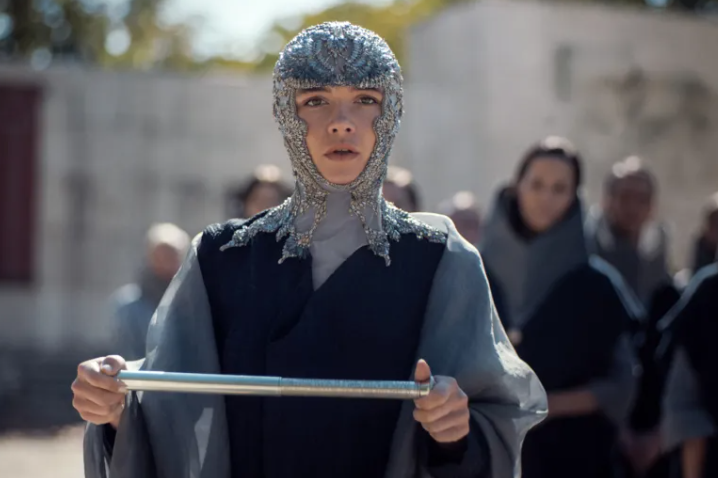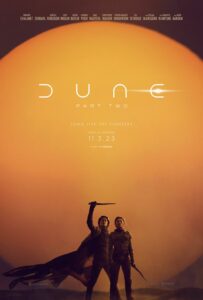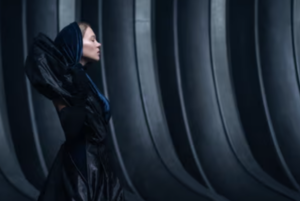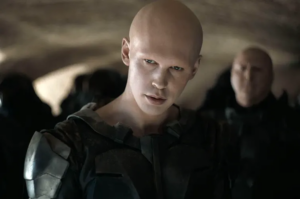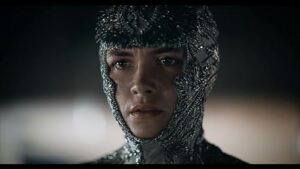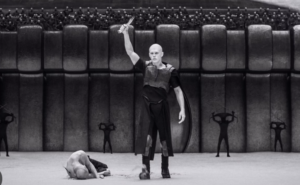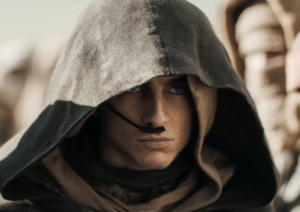Directed by Denis Villeneuve | Written by Villeneuve and Jon Spaihts, based on the novel by Frank Herbert | 168 min | ▲▲▲▲△ | In Cinemas
After a painful delay for this much anticipated blockbuster sequel — just as the first one was delayed — it’s here. In many respects it delivers on the promise of Quebec filmmaker Villeneuve’s 2021 science fiction epic, a film with an astonishing scale and complex politics, an impressive tale of colonial power, resource extraction, and indigenous resistance.
I very much admired the vision of the thing, the universe building in light, sound, music, and performance. If anything the sequel is more politically intense, more complex, and more satisfying for being the conclusion of the story — its predecessor, for all its attributes, tailed off disappointingly in the last half hour. That’s not to say the filmmakers of Dune: Part Two don’t set us up for future sequels — don’t be surprised if ends remain entirely loose.
This one drops right where the first one left off, with Paul Atreides (Timothée Chalamet) and his mother, Jessica (Rebecca Ferguson, solid) having joined the Fremen, the people of the desert planet, Arrakis, a place valuable to powerful interests for its Spice, a psychotropic mineral essential in space travel. To-the-manor-born, Paul wants to prove his usefulness as a warrior to the Fremen while Jessica, a priestess with a politically astute group of witches, the Bene Gesserit, works to convince the Fremen that Paul is a prophet. This while their enemies, the Harkonnen, have returned to mine the Spice, having wiped out most of the Atreides family in the first instalment.
This is grand myth-making science fiction, as indebted to Lawrence of Arabia as it is to Star Wars, which, of course, borrowed a great deal from the original Herbert book — Dune is just taking it back.
The cast expands this time out with almost every young movie star in Hollywood, and a few of the veterans, too: We meet the Emperor, (Christopher Walken, bringing a sense of full-circle inevitability to that Fat Boy Slim track and video with its Dune-related lyrics), and his Bene Gesserit associated daughter, Princess Irulian (Florence Pugh), who provides a helpful narration with her diaristic reports.
We’re also introduced to another member of the Emperor’s household, Lady Margot (Léa Seydoux), and yet another frightening Harkonnen, Feyd-Rautha (an unrecognizable Austin Butler), who’s the centre of an astonishing set-piece in a gladiatorial ring.
The production values are, once again, next level with this film, meeting and, in some cases, surpassing what came before. It’s hard to imagine this year we’ll get better cinematography, sound design, and especially score — composer Hans Zimmer bringing additional flavours to this sequel we haven’t heard from him before, including a gorgeous love theme to accompany the romance in the film’s centre.
For the most part, though it’s fairly chaste, that works, too. The woman of Paul’s dreams. the Freman warrior Channi, has much more to do this time out, though Zendaya doesn’t bring a lot in the way of nuance. She’s either supportive of Paul, or disagreeable — the camera sitting on her Kubrickian glare from a distance, which in the final act is all she’s really required to do.
In the first Dune I doubted Chalamet’s ability to deliver the charisma necessary for the role of a heroic leader, but the camera does love him. He works hard to provide an arc of a figure resistant to the plans set for him but who eventually, and for his own reasons, buys into the machinations sealing his fate.
Speaking of politics, the first Dune had a couple of problematic features I struggled to shake off.
One was the way the narrative was setting up Paul as a White Saviour, a deeply tiresome trope that in the 21st Century needn’t be resurrected. Dune: Part Two addresses this concern head on by being true to Herbert’s apparent suspicion of singular emancipators. Paul is a deeply compromised character, driven by revenge, who leans in to his darker impulses. He doesn’t come off as especially heroic in his successes, even while he’s able to inspire others — it’s all cloaked in a cloud of doom. This Anakin Skywalker could easily become a Darth Vader.
The second problem, unfortunately, Dune: Part Two doubles down on, and that’s the issue of Middle East North African cultural appropriation. It’s simply a failure of imagination — especially egregious given the wealth of creativity otherwise on display — that the filmmakers here lean so heavily on MENA costuming and characteristics for its story. They could have come up with an entirely different look for this while still holding tight to the relevant colonial analogies, and they certainly didn’t need to turn Javier Bardem’s character into a stereotype.
So, my take on this expansive sequel is very much like the first: A cinematic feast, but not without a few issues. Maybe in the inevitable third film, they’ll explain how people dismount from the Shai-Hulud, the enormous sandworm.





